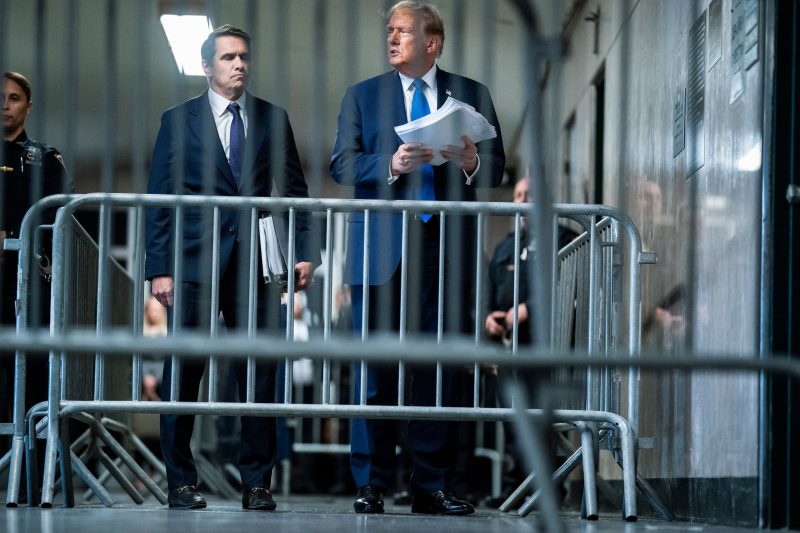Lock Him Up? Americans Believe Trump Is Guilty But Hesitate on Prison Sentencing
 In recent years, the phrase Lock him up has gained significant attention in the American political landscape, particularly in relation to former President Donald Trump. The call for Trump to be imprisoned stems from various controversies and legal issues that have surrounded his tenure in office and his actions before, during, and after his presidency. While many Americans believe Trump is guilty of wrongdoing, there appears to be a reluctance among some to advocate for his imprisonment.
One of the primary reasons driving the Lock him up sentiment is the numerous legal challenges and investigations Trump has faced. These range from the investigation into Russian interference in the 2016 election led by Special Counsel Robert Mueller to allegations of corruption, fraud, and obstruction of justice. Trump's critics argue that his conduct warrants criminal prosecution and incarceration, citing a disregard for the rule of law and democratic norms.
However, the issue of whether to seek Trump's imprisonment is a contentious one, with differing views within American society. Some argue that holding a former president accountable through the criminal justice system sets a crucial precedent for upholding the principles of democracy and ensuring that nobody is above the law. They assert that Trump's actions have had serious consequences and that justice demands accountability, regardless of one's status or position.
Conversely, there is a segment of the population, including some politicians and legal experts, who caution against the idea of pursuing criminal charges against Trump. They argue that the focus should be on healing national divisions, promoting unity, and moving forward as a country. Imprisoning a former president, they contend, could further polarize an already deeply divided nation and detract from addressing pressing issues such as the economy, healthcare, and national security.
Moreover, the judicial system faces significant challenges in prosecuting a former president, including questions of jurisdiction, separation of powers, and the potential for a politically charged trial. Some legal scholars argue that pursuing criminal charges against Trump may be a complex and contentious process that could consume valuable time and resources without necessarily leading to a clear resolution or accountability.
Ultimately, the debate over whether to Lock him up reflects broader questions about the balance between accountability, reconciliation, and the rule of law in a democratic society. While many Americans believe Trump should face consequences for his actions, the path to achieving justice is far from straightforward. As the nation grapples with these complex and consequential issues, it remains to be seen how the Lock him up sentiment will evolve and influence the future trajectory of American politics and governance.
In recent years, the phrase Lock him up has gained significant attention in the American political landscape, particularly in relation to former President Donald Trump. The call for Trump to be imprisoned stems from various controversies and legal issues that have surrounded his tenure in office and his actions before, during, and after his presidency. While many Americans believe Trump is guilty of wrongdoing, there appears to be a reluctance among some to advocate for his imprisonment.
One of the primary reasons driving the Lock him up sentiment is the numerous legal challenges and investigations Trump has faced. These range from the investigation into Russian interference in the 2016 election led by Special Counsel Robert Mueller to allegations of corruption, fraud, and obstruction of justice. Trump's critics argue that his conduct warrants criminal prosecution and incarceration, citing a disregard for the rule of law and democratic norms.
However, the issue of whether to seek Trump's imprisonment is a contentious one, with differing views within American society. Some argue that holding a former president accountable through the criminal justice system sets a crucial precedent for upholding the principles of democracy and ensuring that nobody is above the law. They assert that Trump's actions have had serious consequences and that justice demands accountability, regardless of one's status or position.
Conversely, there is a segment of the population, including some politicians and legal experts, who caution against the idea of pursuing criminal charges against Trump. They argue that the focus should be on healing national divisions, promoting unity, and moving forward as a country. Imprisoning a former president, they contend, could further polarize an already deeply divided nation and detract from addressing pressing issues such as the economy, healthcare, and national security.
Moreover, the judicial system faces significant challenges in prosecuting a former president, including questions of jurisdiction, separation of powers, and the potential for a politically charged trial. Some legal scholars argue that pursuing criminal charges against Trump may be a complex and contentious process that could consume valuable time and resources without necessarily leading to a clear resolution or accountability.
Ultimately, the debate over whether to Lock him up reflects broader questions about the balance between accountability, reconciliation, and the rule of law in a democratic society. While many Americans believe Trump should face consequences for his actions, the path to achieving justice is far from straightforward. As the nation grapples with these complex and consequential issues, it remains to be seen how the Lock him up sentiment will evolve and influence the future trajectory of American politics and governance.
If you would like to delve into the world of investment topics , go to our partner project Wall Street Wizardry
